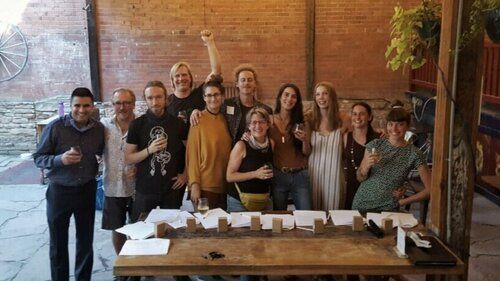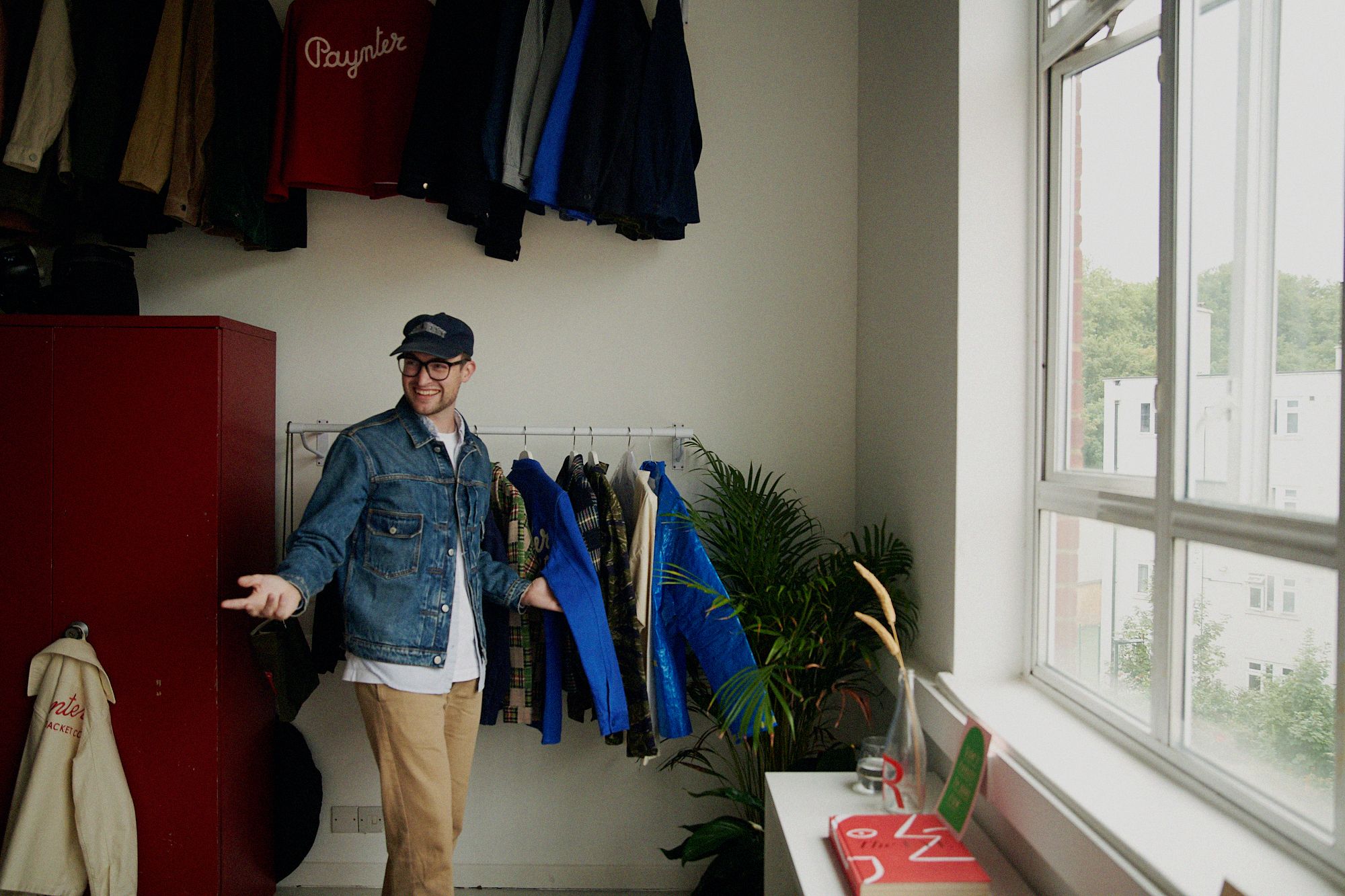
What Employee Ownership Means for Trident Cafe and Booksellers
Featuring insights from Buffer’s Small Business, Big Lessons podcast episode four, and the accompanying unpublished interview, multiple employee-owners of the Trident shared why the bookstore moved to employee ownership and how the shift positively impacted the business.

Freelance writer + growth coach for freelancers
Just as the COVID-19 pandemic began to rage in March 2020, Trident Booksellers and Cafe in Boulder, Colorado faced a similar challenge to small businesses around the world: how to stay afloat.
Employees wanted an honest financial picture of what was happening with their employer. They also had tons of ideas on how to keep the business afloat and they wanted a bigger voice as the group of people who interacted with customers on a regular basis.
It turned out employee-ownership solved both problems, offering transparency and a newfound path toward sustainability and growth.
Open for over 40 years and initially owned by four partners, one owner sold their shares to employees, increasing the total number of owners to 13 and welcoming employees to buy shares of the company after one year of employment.
In a situation some people might decry as an anti-capitalist nightmare, Trident Booksellers and Cafe (also known as “the Trident”) not only found a new lease on life but also discovered growth opportunities stemming from its newly minted employee-owners.
Featuring insights from Buffer’s Small Business, Big Lessons podcast episode four, and the accompanying unpublished interview, multiple employee-owners of the Trident shared why the bookstore moved to employee ownership and how the shift positively impacted the business.

Selling shares to employees
After decades of ownership, one of Trident’s four owners wanted to cash out his shares during the pandemic. He began the process of looking for a buyer and noticed one promising opportunity: his employees.
Initially not on anyone’s mind when the Trident partner wanted to sell his shares, an employee buyout made immediate sense given the Trident’s history and how employees showed up in the company.
The cafe attracted a serious crowd of regulars, some who had been coming for decades, citing the quirky culture, friendly staff, and historic building as key reasons for always coming back. Employees and regulars built strong bonds of friendship over the years. Sophia, a barista-owner at the Trident, even said one regular feels almost like her uncle rather than just a customer.
This kind of environment made employee ownership attractive to the Trident’s other three owners. They realized that the strong bonds employees had with customers could benefit the whole organization.
Employees regularly acted like owners within the Trident, sharing ideas upward and caring deeply for customers. So giving them the opportunity to actually become owners was a great next step as it not only rewarded loyalty in employees but also helped ensure the Trident would retain its unique culture under new ownership.
Cyanne Stonesmith, an employee-owner who runs the Trident’s bookstore business, explained that “with all the uncertainty that was happening” with the pandemic, “it felt like the right time” for employees to buy into the business. Nine employees bought shares at the time and Cyanne said employees collectively own one-third of the business.
Everyone can speak to the manager
A distinct positive shift occurred for the Trident after it became employee-owned. Previously, regulars that had questions or wanted to speak with an owner - feedback from customers had always been part of the culture - required a big song and dance. Employees would either have to grab an owner if they were around or relay the notes upward and hope someone listened.
Now, every customer can speak to the manager because chances are they just made your coffee. And with the new cooperative ownership structure, the original three owners also occasionally work shifts at the Trident to be closer to their customers and co-owners.
Jake, an Assistant Manager and part-owner who runs the beer and wine program at the Trident, shared his feelings about this shift.
“We're not just trying to make it to the next quarter and grow and grow and grow,” said Jake. “Which is nice. It feels like people's voices are respected. They feel heard.”
Part of that newfound feeling that employees feel heard stems from the Trident’s new consensus-focused management style. Under the previous ownership structure, the four owners made decisions, and employees executed those decisions. Employee feedback was always welcome, but it didn’t always make it to the decision-making table. Now, Cyanne shared that the 13 owners focus more on building consensus for decisions and use a majority vote structure to make decisions.
“It's not about an individual,” said Cyanne. “It's about a community, and being able to work with your co-workers and your co-owners is one of the most rewarding things.”
It’s a priority in meetings to ensure everyone’s ideas are heard before a vote, then the team operates on a disagree-and-commit style structure so decisions don’t get lost in endless conversations. This means that people don’t get their way all the time, but the weekly (or sometimes bi-weekly) structure of management meetings offers everyone the time to say their bit.
“Everyone's opinion is respected, everyone gets a say, and then at the end of those discussions, if we need to make a yes or no decision, we take a vote and it’s a majority vote,” said Cyanne. “And so even if everyone doesn't agree, or everyone doesn't get the outcome that they wanted, we all really respect each other's opinions and our thoughts.”
The impacts of ownership
The Trident has been a central figure in Boulder since its founding over 40 years ago, cultivating a community that has global reach. Baristas have even been recognized in different countries by travellers who visited the Trident, with regulars and holiday guests alike thrilled that their favorite barista is also a part-owner in the company.
An unexpected benefit for the Trident is that employee ownership became its own marketing campaign of sorts. Cyanne said new customers - both from Boulder and tourists to the area - chose to stop at the Trident because they are fascinated by a cafe where the baristas own a piece of the business. This wasn’t intentional nor was it actively marketed, but the tight-knit culture of the Trident meant regulars heard about the shift, word got out, and people were drawn in with fascination.
Underneath the global recognition and cool-factor, though, lies the real impact of employee ownership: not only do employees feel a renewed sense of pride for their company now that they own a piece of it, but owning part of an asset gives employees real leverage in their lives. As homeownership for millennials and Gen-Z is increasingly out of reach in cities like Boulder, owning shares in a business becomes the asset that employees can borrow against, leverage, and have a deeper personal impact on.
Further, since the Trident is already set up for consensus-style management and new employees are welcome to buy into the company after one year of work, there’s even more opportunity for the Trident to have impact beyond creating local jobs. And the 13 current owners are excited to see who comes along next.
“I'm really excited for more people to buy in,” said Cyanne.
Try Buffer for free
180,000+ creators, small businesses, and marketers use Buffer to grow their audiences every month.
Related Articles

In order to grow their companies, these entrepreneurs learned to let go of outdated beliefs that no longer served themselves or their businesses.

These small business owners use their platforms to speak up about deserving causes and have incorporated elements into their businesses to help make a difference.

In Small Business, Big Lessons, season two, episode six, we detail how the owners of Harlow, SparkToro, Made With Local, Zingerman’s, Destination Unknown Restaurants and Paynter Jackets approach getting support as small business owners.